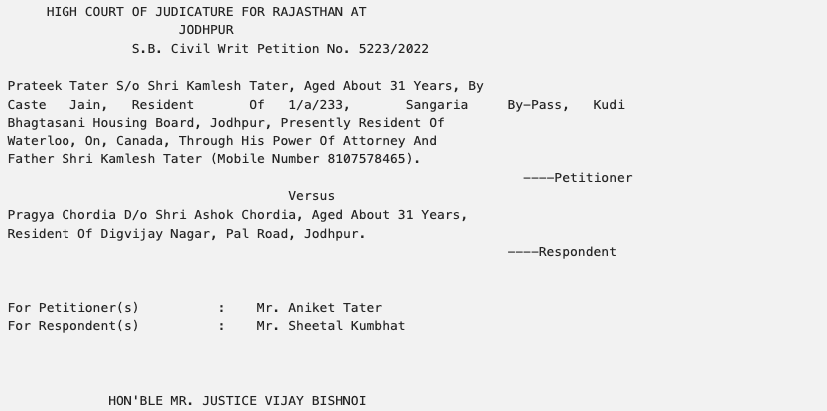The case of Prateek Tater vs Pragya Chordia, decided on May 16, 2022, provides an interesting insight into the legal complexities surrounding representation in family court proceedings. This case was brought to the forefront following an order dated March 7, 2022, by the Family Court No.1, Jodhpur, which dismissed an application filed on behalf of the petitioner, Prateek Tater, by his father acting as his power of attorney holder.
Background: Prateek Tater and Pragya Chordia’s marriage, solemnized on October 7, 2020, in Jodhpur, soon ran into difficulties, leading to their separation the same day. Despite efforts for reconciliation, they eventually filed for mutual consent divorce under Section 13-B of the Hindu Marriage Act, 1955, on October 26, 2021. The Family Court scheduled counseling for April 20, 2022.
Key Legal Turn: The couple also jointly requested a waiver of the six-month statutory cooling-off period required under Section 13-B(2) of the Act. However, this request was denied by the Family Court on November 16, 2021. Aggrieved by this order, Pragya Chordia filed a writ petition in the High Court, which, referencing the Supreme Court’s decision in Amardeep Singh vs. Harveen Kaur, granted the waiver, instructing the Family Court to expedite the divorce proceedings.
The Complication: The crux of the dispute arose when Prateek Tater’s father, armed with a power of attorney, sought to represent his son in the Family Court, given that Prateek was working in Canada. The Family Court refused this request, citing the High Court’s directive for the parties to be present in person.
Legal Debate: This situation led to a significant legal debate. The counsel for both parties argued that the Family Court had erred in its decision. They referenced the Supreme Court’s observation in Amardeep Singh’s case, which allows for representation through close relations like parents or siblings in situations where the parties cannot appear in person for valid reasons.
Resolution: The Court, recognizing the practical difficulties and the precedent set by the Supreme Court, ruled in favor of allowing Prateek Tater’s father to represent him. This decision was also facilitated by the fact that Pragya Chordia had no objections to this arrangement.
Implications: This case highlights the evolving nature of legal representation in family court proceedings, especially in an era where geographical constraints can pose significant challenges. The judgment underscores the judiciary’s willingness to adapt to the realities of modern life, ensuring that justice is accessible and efficient, even when parties are unable to be physically present.
Conclusion: Prateek Tater vs Pragya Chordia serves as a noteworthy example of the legal system’s flexibility in accommodating the needs of parties involved in family disputes. It reinforces the idea that the courts can, and often do, find ways to balance legal formalities with practical realities.
